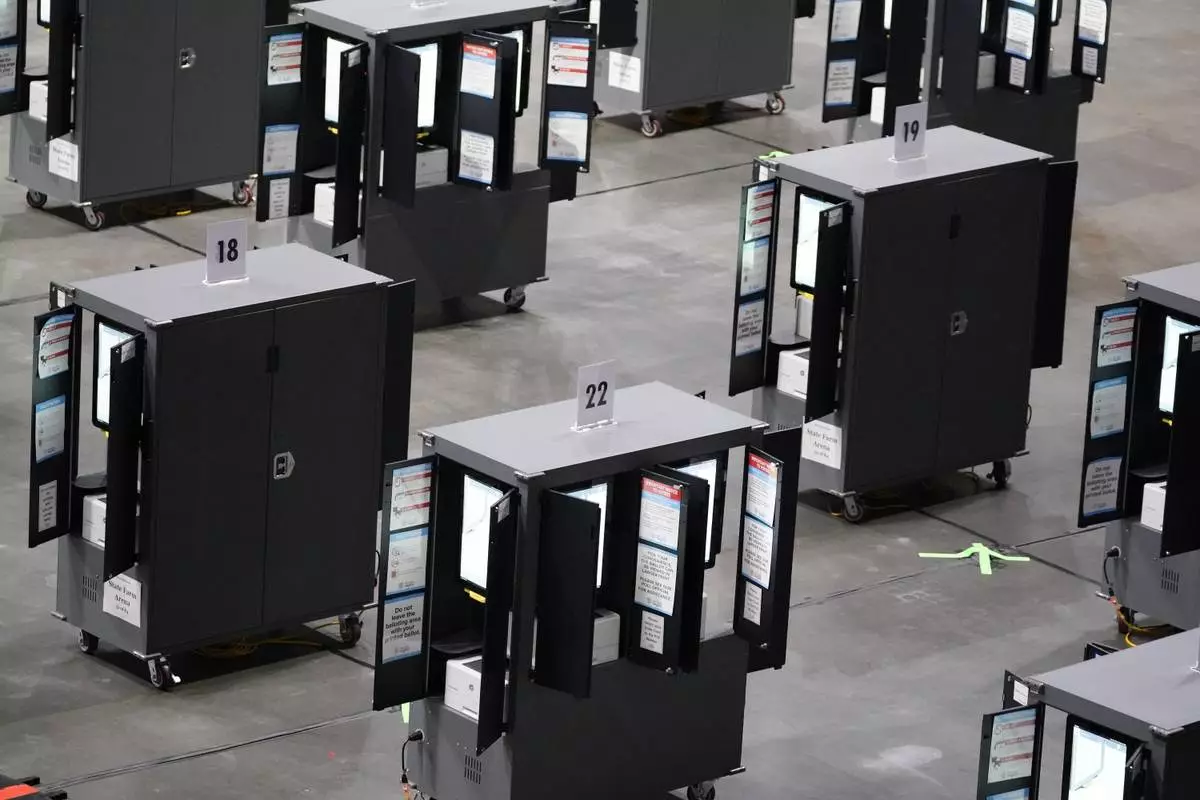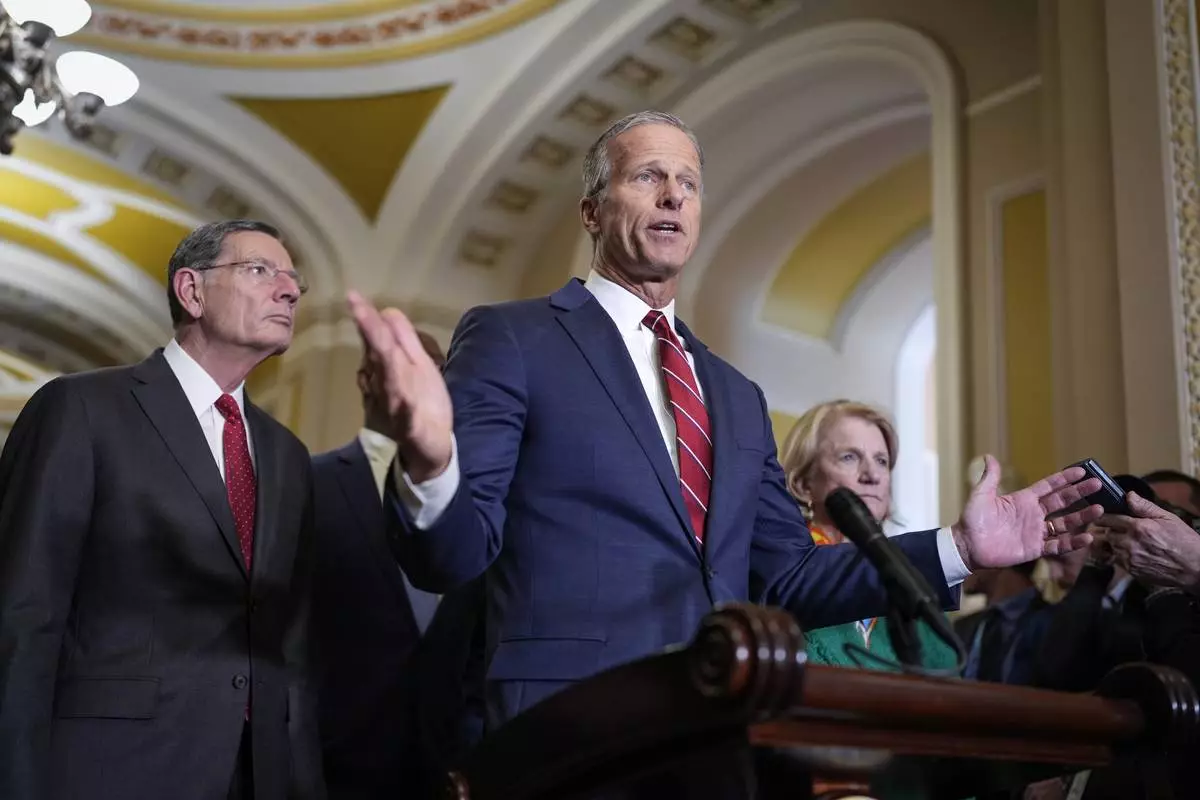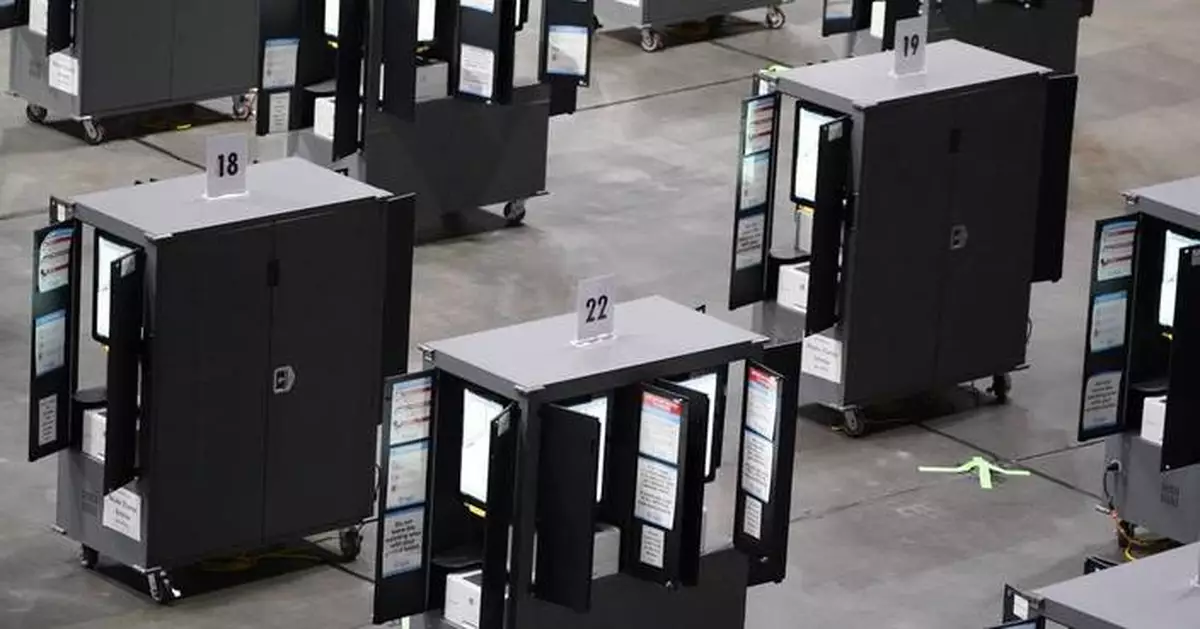ATLANTA (AP) — A federal judge has declined to block the use of Georgia's electronic voting system in a long-running lawsuit alleging that the system is vulnerable to attack and has operational issues that could deprive voters of their constitutional rights.
U.S. District Judge Amy Totenberg found that the activists and individual voters who challenged the state's voting system didn't prove that problems prevented them from voting, diluted their votes or kept their votes from being counted. Therefore, she wrote in a ruling Monday, they lack standing to sue, leaving her unable to consider the merits of their claims.
Georgia election officials have consistently said the system is secure and reliable and that it's up to the state to decide how it conducts elections. Secretary of State Brad Raffensperger celebrated the ruling as a “resounding vindication of Georgia's elections.”
The ruling follows several years of intense focus on Georgia's elections in the aftermath of President Donald Trump's narrow loss in the state to Democrat Joe Biden in the 2020 presidential election. Trump claimed without evidence that election fraud cost him victory, and his allies spread wild conspiracy theories about the Dominion Voting Systems machines used in Georgia.
The lawsuit at issue long precedes those claims. It was originally filed in 2017 by several individual voters and the Coalition for Good Governance, which advocates for election integrity, and targeted the outdated, paperless voting system used at the time. After Georgia purchased a new voting system in 2019, the suit was amended to target that system.
Marilyn Marks, executive director of the Coalition for Good Governance, called the lack of standing finding “a serious misinterpretation of the law." She said the state should adopt hand-marked paper ballots for elections in 2025 and 2026 “to protect the integrity of our elections and restore public confidence.”
David Cross, an attorney for some of the individual voters, said the Supreme Court has long held that “the right to vote includes the right to have one's vote counted” and said the ruling “vitiates that right.”
The election system used statewide by nearly all in-person voters includes touch screen voting machines that print ballots with a human-readable summary of voters’ selections and a QR code that a scanner reads to count votes.
The activists and voters who filed the lawsuit argued that since people can't read a QR code, they are unable to ensure that what the scanners are reading accurately reflects their selections. They also asserted that it is burdensome for voters to have to check their selections twice: once on the touch screen and again using the limited information on the printed ballot.
They asked Totenberg to stop the state from using the touch screen voting machine system as the standard method for in-person voting.
“Although Plaintiffs have not ultimately prevailed on their legal claims, their work has identified substantial concerns about the administration, maintenance, and security of Georgia’s electronic in-person voting system,” Totenberg wrote. “These investigative and educational efforts have prompted meaningful legislative action to bolster the transparency and accountability of Georgia's voting systems.”
In addition to other changes, a law passed by Georgia lawmakers last year requires QR codes to be removed from ballots by July 2026, though Totenberg noted that change requires funding and government action.
The judge outlined the evidence presented at trial in early 2024, including the findings of University of Michigan computer scientist and professor J. Alex Halderman. He testified that an attacker could potentially alter the QR codes to change voter selections, install malware on the voting machines and obtain passwords, among other issues, she wrote.
A report Halderman wrote in 2021 as part of this lawsuit prompted the federal Cybersecurity and Infrastructure Security Agency to publish an advisory in 2022 recommending steps that should be taken by election officials in places that use the voting machines Georgia uses. Georgia election officials decided to wait until after the 2024 election to install a software update to address some of the security flaws, saying they had taken other measures to secure the system.
Totenberg's ruling ends a long and twisting saga. Throughout the process, she has repeatedly expressed concerns about the state's voting system and practices and, early on, accused state officials of ignoring problems.
Conspiracy theorists and others looking to bolster Trump's claims of a stolen election have seized on Totenberg's preliminary rulings, as well as on Halderman's findings. But Halderman has always made clear that his mission was to identify vulnerabilities in the system, that he was not tasked with looking for and had not found any evidence that those weaknesses had been exploited.

FILE - Voting machines fill the floor for early voting at State Farm Arena, Oct. 12, 2020, in Atlanta. (AP Photo/Brynn Anderson, File)
WASHINGTON (AP) — As stock markets tumble in the aftermath of President Donald Trump's sweeping tariffs, Republicans in Congress were watching with unease and talking of clawing back their power to levy tariffs — but almost none seemed ready to turn their words into action.
The Republican president is upending longstanding GOP principles like support for free trade, yet despite clear misgivings and a Constitutional mandate to decide tariffs, most lawmakers were not ready to cross Trump. Instead, they were focusing all their attention on advancing the president's " big, beautiful bill ” of tax breaks and spending cuts, even as tariffs — in essence, import taxes — threatened to raise consumer prices across the board and push the global economy into a recession.
As the fallout from Trump's announcement reverberated around global markets, Senate Majority Leader John Thune, who has made it clear he is no fan of tariffs, told reporters that he would give Trump "the benefit of the doubt” in hopes that the announcement was just a scare tactic to prod foreign leaders into negotiating better trade deals with the U.S.
“The president is a dealmaker if nothing else, and he's going to continue to deal country by country with each of them,” said Sen. John Barrasso, a Wyoming Republican who is no. 2 in GOP Senate leadership. He added that Treasury Secretary Scott Bessent had told Senate Republicans this week that the tariffs announced by Trump would be a “high level mark with the ultimate goal of getting them reduced” unless other countries retaliate.
But countries like China are already retaliating with tariffs of their own, and while the president has signaled he is open to negotiations, he was mostly sounding a defiant tone Friday, saying on social media that “MY POLICIES WILL NEVER CHANGE” while claiming that foreign investors were lining up to invest in U.S. industries. He was on the golf course Friday near his Mar-a-Lago private club in Florida.
Congress, however, was jittery.
A handful of Republicans have rebuked Trump's strategy as a foolhardy path that will burden U.S. households. Kentucky Sen. Mitch McConnell, the longtime Senate leader who was the standard-bearer for past generations of Republicans, released a lengthy statement saying, “As I have always warned, tariffs are bad policy, and trade wars with our partners hurt working people most.”
McConnell and three other Republicans joined with Democrats this week to help pass a resolution that would nullify Trump's tariffs on Canada, sending a rebuke to the president just hours after his “Liberation Day” announcement. But House Speaker Mike Johnson quickly indicated he has no interest in giving the resolution a vote.
Lawmakers' struggle to act showed the divide among Republicans on trade policy, with a mostly younger group of Republicans fiercely backing Trump's strategy. Rather than heed traditional free trade doctrine, they argue for “America First” protectionism and hope it will revive U.S. manufacturing.
Republican Sen. Josh Hawley said that workers in his home state of Missouri were “absolutely thrilled” with the tariffs. “We've been losing jobs left and right. Farmers want to see a fair deal for our products, both in Canada and in Mexico and from the (European Union)," he added.
For their part, Democrats slammed Trump's tariffs as a reckless maneuver meant to do nothing more than raise funds for the tax breaks Trump and Republicans are trying to pass.
“Why would he raise the costs on American families by $5,000, as it’s estimated? Simply because his very wealthy billionaire friends want a greater tax break,” Senate Democratic Leader Chuck Schumer said in a floor speech Friday.
Other Republicans were looking for roundabout ways to at least check the president's power on trade policy. Sen. Chuck Grassley, a senior Republican from Iowa, introduced a bipartisan bill Thursday that would require presidents to justify new tariffs to Congress. Lawmakers would then have to approve the tariffs within 60 days, or they would expire.
Although Grassley emphasized that he had long been working on the idea, the timing of the bill was notable. It gave Republicans a chance to talk about their distaste for import taxes and raised the prospect of Congress clawing back some of its power over tariffs. The Constitution gives Congress the responsibility of setting taxes and tariffs, but over the last century, lawmakers have ceded much of their power over import taxes to the president.
A handful of Republicans said they were favorable to Grassley's proposal, though the idea of directly defying Trump seemed to squelch potential for quick action.
“I don’t want to do it in a politically charged environment,” said Sen. Mike Rounds, a South Dakota Republican. “But I absolutely agree. This was set up by the Founding Fathers to be Congress’s role. And, I think we’re way past the point of what the Founding Fathers ever wanted to have happen."
Democratic Sen. Brian Schatz seized on the hesitation from Republicans, saying on social media Friday that the Senate would overwhelmingly repeal or constrain tariff authority “if every Senator voted their conscience and their state’s interest.”
“Mostly everyone hates this, they are just too afraid of the Mad King at the moment,” Schatz added.
Sen. John Kennedy, a Louisiana Republican, also predicted the bill would never pass “because of the voting requirements in the Senate.”
But he was still taking to social media to offer a folksy bit of advice: “Tariffs are like whiskey: A little whiskey, under the right circumstances, can be refreshing — but too much whiskey, under the wrong circumstances, can make you drunk as a goat.”

House Minority Leader Hakeem Jeffries, D-N.Y., criticizes the agenda of President Donald Trump and the tactics of billionaire Elon Musk in a pivotal Wisconsin election where Democrats won, during a news conference at the Capitol, in Washington, Wednesday, April 2, 2025. (AP Photo/J. Scott Applewhite)

Senate Minority Leader Chuck Schumer, D-N.Y., attends a news conference discussing the Republican-backed budget plan at the Capitol, in Washington, Thursday, April 3, 2025. (AP Photo/J. Scott Applewhite)

Senate Majority Leader John Thune, R-S.D., joined by Sen. John Barrasso, R-Wyo., the GOP whip, left, talks to reporters ahead of announcements by President Donald Trump on tariffs, at the Capitol, in Washington, Tuesday, April 1, 2025. (AP Photo/J. Scott Applewhite)

Speaker of the House Mike Johnson, R-La., talks with reporters as he arrives for a closed-door strategy session with fellow Republicans ahead of announcements by President Donald Trump on tariffs, at the Capitol, in Washington, Tuesday, April 1, 2025. (AP Photo/J. Scott Applewhite)

Senate Judiciary Committee Chairman Chuck Grassley, R- Iowa, takes his seat as the panel meets to consider prescription drug pricing and other measures, at the Capitol in Washington, Thursday, April 3, 2025. (AP Photo/J. Scott Applewhite)























































